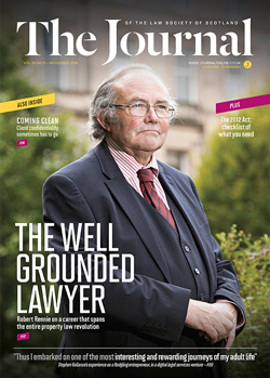Law reform roundup
The Smith Commission
The Society made its submission to the Smith Commission on further devolved powers for the Scottish Parliament. The Society hosted a very successful member engagement event with Lord Smith, which showed that the profession is engaged and focused on practical suggestions for further devolution. Areas covered included the need to consider better checks and balances within the legislative system. Members also raised the issues of devolution of unincorporated associations such as partnerships, as well as employment tribunals.
The Society’s final submission (www.lawscot.org.uk/members/independence-referendum-2014/) discusses devolution of the regulation of solicitors who provide legal advice and services relating to consumer credit, insolvency practice, financial services and immigration. These are currently considered to be reserved, as the substantive law is reserved. The Society proposes that provision of advice on these matters should be fully devolved.
Serious Crime Bill
The Society submitted a number of amendments at report stage, reflecting its concerns that serious crime prevention orders may be applied for by the police or prosecution, and imposed by the court, purely on a speculative basis, without the person concerned having been convicted of any serious offence, these being “stand-alone” orders. Given their restrictive nature, the Society believes that it would be unreasonable to impose such orders where an alleged offence remained unproven. If no prosecution has been brought, the person will not have had the opportunity to respond to any allegations made. All the Society’s amendments were tabled by Lord Mackay of Drumadoon and, following debate, were withdrawn.
Recall of MPs Bill
The Society submitted a second reading briefing. It believes that amending the Representation of the People Act 1983 to provide for disqualifying MPs who have received a prison sentence of less than one year would achieve the same aims, and would be a more constitutionally appropriate way of removing an MP from office. It also had concerns about the requirement for 10% of eligible constituents to sign the recall petition for it to be considered successful, as it would in theory be easier to raise a successful petition in a smaller, more rural constituency with fewer people.
Regulation of Scottish charities
The Charity Law Committee responded to the Office of the Scottish Charity Regulator (OSCR) consultation on proposed changes to the questions asked in its annual return, which all charities are obliged to complete. Charities will have to answer a number of sections depending on their income level, with the lowest income threshold being set at £25,000. The Society is concerned that the new questions and how they are structured within the annual return will place an undue burden particularly on smaller charities. The income threshold should broadly reflect the level of income a typical charity with at least one full time paid member of staff would be likely to have. Regarding the introduction of a serious incident reporting obligation, requiring charities to report every instance of fraud or theft, amongst other matters, to OSCR, the Society would like to see further consideration of what constitutes a serious incident and whether reporting to OSCR is always appropriate.
Assisted Suicide (Scotland) Bill
The Society gave evidence to the Justice Committee on 28 October. Alison Britton, convener of the Health & Medical Law Committee, reiterated the Society’s call for greater clarity and definition if the proposed legislation is to achieve its stated aims. It is imperative for there to be clear definitions of what constitutes assisted suicide and what is meant by the term “licensed facilitator”. Coral Riddell, head of Professional Practice, spoke on the Society’s concerns around a solicitor being able to act as a proxy to sign the request for assisted suicide for a person who is unable to do so. Given the significant and irreversible nature of the act of ending a life, the Society is of the view that a medical practitioner would be better placed than a solicitor to assess whether or not a person has the necessary capacity to understand the effect of a proxy signature.
Full details of the above, and further information on the current work of the law reform department can be found at www.lawscot.org.uk/forthepublic/law-reform-consultations-and-billsThe team can be contacted on any of the matters above through louisedocherty@lawscot.org.uk, or follow us on twitter: @lawscot
In this issue
- Age before duty
- Title to tissue
- Standing the test of time?
- Adjudication: a risk of abuse?
- Courts in all but name
- When is a person a “relevant person”?
- Reading for pleasure
- Opinion: John Scott QC
- Book reviews
- Profile
- President's column
- People on the move
- The designated day is here
- A tale of two systems
- LBTT: the rules and rates emerge
- The price of probity
- Play to your strengths
- Into the unknown
- A changing landscape
- Get the basics right
- Holiday pay: give us a break
- Money into thin air?
- Pathways to justice
- Flesh on the bones
- Scottish Solicitors Discipline Tribunal
- Streams of thought
- Over the finishing line
- Over the finishing line (full version)
- Law reform roundup
- The path less travelled
- The right kind of risk
- Frauds and scams – increasing awareness
- Ask Ash
- The process engineer's tale
- To disclose or not to disclose?






